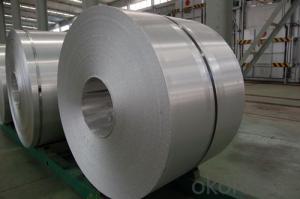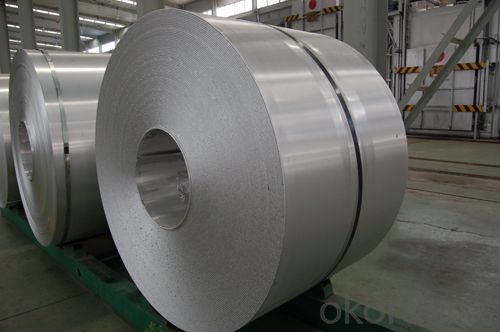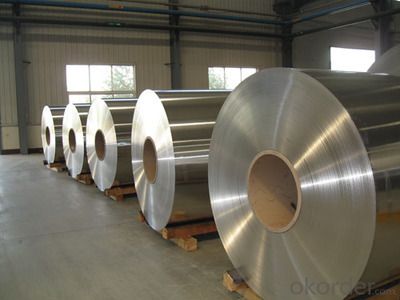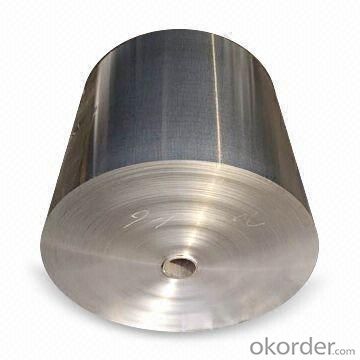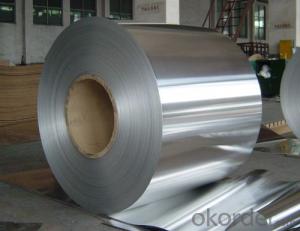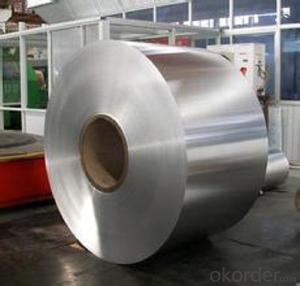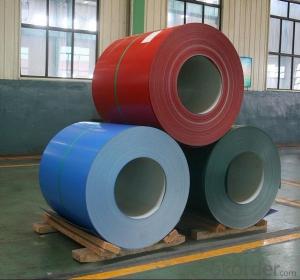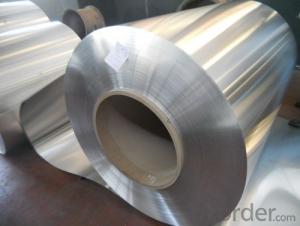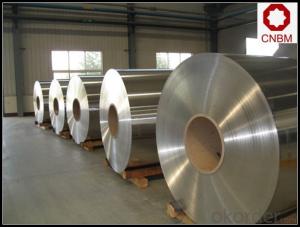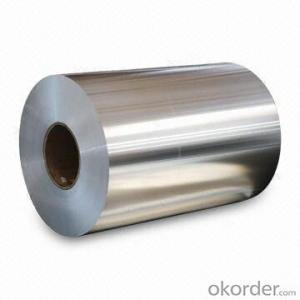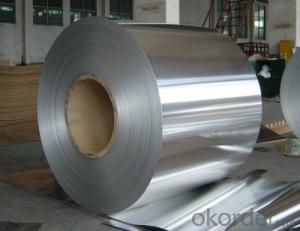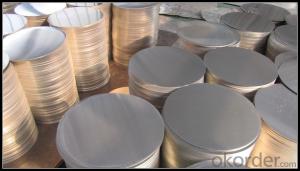Aluminum Coil Anodizing for Roofing Ceiling Decoration High Quality China
- Loading Port:
- Tianjin
- Payment Terms:
- TT OR LC
- Min Order Qty:
- 10000 m.t
- Supply Capability:
- 10000 m.t/month
OKorder Service Pledge
OKorder Financial Service
You Might Also Like
Specification
1.specializes of aluminum coils
Aluminum coil |
| |||||
Alloy | 1050,1060,1070,1100,1145,1235 | O,H12,H22,H14,H24,H16,H26,H18 | ||||
3003,3004,3014,3105,3102 | O,H12,H22,H14,H24,H16,H26,H18 | |||||
5052,5754,5005,5083 | O,H12,H22,H14,H24,H16,H26,H18 | |||||
8011 | O,H12,H22,H14,H24,H16,H26,H18 | |||||
Specification |
Kindly Notice:dimensions also can be produced as your party request | |||||
Packing:standard export packing,wooden pallet.
|
| |||||
Delivery Time | 30days after receiving your depoist or original L/C. | |||||
Minimum Order | 5 tons | |||||
The term of Payment | T/T, Irrevocable L/C at sight. | |||||
Application | Mainly used in Construction , decoration,packaging, printing, cover material,piping, electronic elements, referigeration, air conditioner, automobile, and so on.
| |||||
Surface | Mill Finish | |||||
Origin | Henan,China
| |||||
Aluminum coil |
| |||||
Alloy | 1050,1060,1070,1100,1145,1235 | O,H12,H22,H14,H24,H16,H26,H18 | ||||
3003,3004,3014,3105,3102 | O,H12,H22,H14,H24,H16,H26,H18 | |||||
5052,5754,5005,5083 | ||||||
8011 | O,H12,H22,H14,H24,H16,H26,H18 | |||||
Specification |
Kindly Notice:dimensions also can be produced as your party request | |||||
Packing:standard export packing,wooden pallet
| Eye to sky |
| ||||
Eye to Wall |
| |||||
Delivery Time | 30days after receiving your depoist or original L/C. | |||||
Minimum Order | 5 tons | |||||
The term of Payment | T/T, Irrevocable L/C at sight | |||||
Application | Mainly used in Construction , decoration,packaging, printing, cover material,piping, electronic elements, referigeration, air conditioner, automobile, and so on
| |||||
Surface | Mill Finish | |||||
Origin | Henan,China
| |||||
FAQ
Q: Do you have the CE, TUV, UL Certification?
A: We’ve already passed all the tests, and any certificate is available.
Q: Have you ever sold your products to companies in my country?
A: Of course, we have customers in all general PV markets, but I think we should expand our market share along with the market growth.
Q: How do you pack your products?
A: We have rich experience on how to pack to make sure the safety on shipment when it arrives at the destination.
Q: Can you do OEM for us?
A: Yes, we can.
Q: Can we visit your factory?
A: Surely, I will arrange the trip basing on your business schedule.
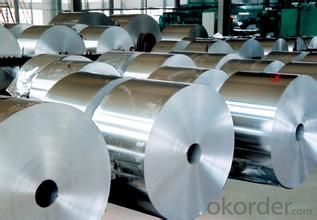
- Q: What are the transportation and storage requirements for aluminum coils?
- The transportation and storage requirements for aluminum coils involve careful handling and protection. During transportation, coils should be securely strapped or loaded onto pallets to prevent damage or shifting. They should be transported using appropriate equipment, such as flatbed trucks, to avoid bending or distorting the coils. Additionally, coils should be stored in a clean, dry, and well-ventilated area to prevent corrosion. They should be stored horizontally, with proper support to avoid any deformation. Proper labeling and documentation are also necessary for tracking and identification purposes.
- Q: What are the common transportation methods for aluminum coils?
- The common transportation methods for aluminum coils include trucking, rail, and shipping. Trucking is often used for short distances or when there is a need for prompt delivery. Aluminum coils are typically loaded onto flatbed trailers or specialized coil trailers equipped with cradles or coil racks to secure them in place during transit. This method offers flexibility and allows for easy access to various locations. Rail transportation is commonly used for long-distance shipments. Aluminum coils are loaded onto railcars, which are specifically designed to accommodate the weight and dimensions of the coils. Rail transportation is advantageous for its cost-effectiveness and ability to transport large quantities of coils in a single shipment. Shipping by sea is another common method for transporting aluminum coils, especially for international shipments. Coils are typically loaded onto cargo ships in specialized containers or directly onto the ship's deck. Shipping offers the advantage of carrying large volumes of coils over long distances, and it is often the preferred method for global distribution due to its efficiency and cost-effectiveness. Overall, the transportation methods for aluminum coils depend on factors such as distance, urgency, quantity, and destination. Companies must consider these factors to determine the most suitable transportation method for their specific needs.
- Q: Can aluminum coils be used in corrosive gas environments?
- Corrosive gas environments can indeed accommodate the use of aluminum coils. Aluminum is widely recognized for its exceptional resistance to corrosion, particularly under atmospheric conditions. An oxide layer naturally develops on the metal's surface, acting as a safeguard against further corrosion. Nevertheless, it is crucial to acknowledge that aluminum is prone to vulnerability in the presence of specific corrosive gases, such as chloride and sulfur compounds. In such instances, it may be imperative to adopt supplementary protective measures, such as surface treatment or coating, to guarantee the durability and efficacy of the aluminum coils within corrosive gas environments.
- Q: Is it possible to use aluminum coils as a material for insulation?
- <p>Aluminum coils are not typically used for insulation materials. Aluminum is a good conductor of heat and electricity, which makes it unsuitable for insulation purposes where the goal is to prevent the flow of heat or electricity. Insulation materials are usually poor conductors of heat, such as fiberglass, mineral wool, or plastic foams, which help to retain heat within a space or prevent the loss of heat to the environment. Aluminum coils are more commonly used in applications where heat transfer is desired, such as in heat exchangers or electrical wiring.</p>
- Q: What are the common testing methods for aluminum coils?
- There are several common testing methods for aluminum coils that are used to ensure their quality and performance. These methods include: 1. Visual inspection: This involves a thorough examination of the coils for any visible defects such as dents, scratches, or surface irregularities. Visual inspection is a basic and initial step in the testing process. 2. Dimensional measurement: This method involves measuring the dimensions of the aluminum coils to ensure they meet the specified requirements. This includes measuring the length, width, and thickness of the coils. 3. Tensile testing: Tensile testing is performed to assess the mechanical properties of the aluminum coils, such as their strength and elasticity. This test involves applying a tensile force to a sample of the coil until it breaks or deforms, allowing for the determination of its tensile strength. 4. Hardness testing: The hardness of aluminum coils is an important factor in determining their suitability for specific applications. Various hardness testing methods, such as Rockwell or Brinell hardness tests, can be used to measure the resistance of the coil's surface to indentation or scratching. 5. Chemical composition analysis: This method involves analyzing the chemical composition of the aluminum coil to ensure it meets the required specifications. Common techniques used for this analysis include spectroscopy or X-ray fluorescence (XRF) analysis. 6. Corrosion resistance testing: Aluminum coils are often exposed to harsh environmental conditions, so assessing their resistance to corrosion is crucial. This can be done through various tests like salt spray testing or electrochemical impedance spectroscopy (EIS) to determine the coil's ability to withstand corrosion. 7. Coating quality assessment: If the aluminum coil is coated with a protective layer, testing methods such as adhesion testing, coating thickness measurement, or impact resistance testing can be used to ensure the quality and durability of the coating. These are some of the most common testing methods employed for aluminum coils. By conducting these tests, manufacturers can ensure that the coils meet the required standards and perform optimally in their intended applications.
- Q: What are the surface treatment options for aluminum coils?
- There are several surface treatment options available for aluminum coils, depending on the specific requirements and desired outcomes. Some common options include: 1. Anodizing: This is a widely used treatment method that involves creating a protective oxide layer on the surface of the aluminum coil. Anodizing provides corrosion resistance, improves durability, and allows for color customization through dyes. 2. Painting: Aluminum coils can be coated with various types of paint to enhance their appearance, provide additional protection against corrosion, and improve resistance to UV radiation. Both liquid and powder coatings are available, with different finishes and levels of durability. 3. Coil coating: This is a continuous process where a coating material is applied to the aluminum coil's surface. The coil is then cured, resulting in a uniform and durable coating. This treatment option offers a wide range of finishes, colors, and special effects. 4. Laminating: By applying a protective film or sheet onto the surface of the aluminum coil, laminating can enhance its resistance to scratches, abrasion, and chemicals. This treatment is often used in applications where the coil may come into contact with harsh environments. 5. Brushing or polishing: These mechanical treatments can give the aluminum coil a desired texture, such as a brushed or mirror-like finish. Brushing creates a pattern of parallel lines, while polishing results in a highly reflective, smooth surface. 6. Chemical conversion coatings: These coatings are typically applied as a pre-treatment before painting or as a standalone treatment. They enhance corrosion resistance and provide a base for subsequent coatings, such as paint or powder coating. These are just a few examples of the surface treatment options available for aluminum coils. The choice of treatment will depend on factors such as the desired appearance, level of corrosion resistance, durability, and the specific application requirements.
- Q: Explain the distinction between aluminum coil and copper coil, highlighting their properties and uses.
- <p>Aluminum coil and copper coil are both metal coils used in various industries, but they have distinct properties. Aluminum coil is lighter, more corrosion-resistant, and less expensive than copper coil. It is often used in applications where weight and cost are concerns, such as in construction and electrical wiring. Copper coil, on the other hand, has superior electrical conductivity and is more ductile, making it ideal for electrical applications where high conductivity is required, such as in power transmission cables and wiring for electronics. Copper is also used in plumbing due to its resistance to corrosion. In summary, the choice between aluminum and copper coil depends on the specific requirements of the application, including factors like conductivity, weight, cost, and resistance to corrosion.</p>
- Q: Can aluminum coils be anodized for enhanced durability?
- Yes, aluminum coils can be anodized to enhance their durability. The anodizing process creates an oxide layer on the surface of the aluminum, making it more resistant to corrosion, wear, and abrasion. This improves the overall lifespan and performance of the coils.
- Q: How are aluminum coils used in the production of food processing equipment?
- Aluminum coils are commonly used in the production of food processing equipment due to their excellent thermal conductivity, corrosion resistance, and lightweight nature. These coils are often formed into various shapes and sizes to create components like heat exchangers, evaporators, and condensers that help regulate temperature during food processing. Additionally, aluminum coils can be easily cleaned and sanitized, making them ideal for use in the food industry where hygiene is crucial.
- Q: How are aluminum coils protected against scratching?
- Aluminum coils are typically protected against scratching through various methods such as applying a protective film or coating, using protective packaging materials, or employing proper handling and storage procedures to minimize contact with abrasive surfaces.
Send your message to us
Aluminum Coil Anodizing for Roofing Ceiling Decoration High Quality China
- Loading Port:
- Tianjin
- Payment Terms:
- TT OR LC
- Min Order Qty:
- 10000 m.t
- Supply Capability:
- 10000 m.t/month
OKorder Service Pledge
OKorder Financial Service
Similar products
Hot products
Hot Searches
Related keywords
